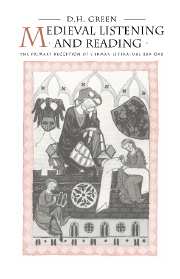Book contents
- Frontmatter
- Contents
- Preface
- List of abbreviations
- PART I Preliminary problems
- PART II Three modes of reception
- Introduction
- 3 Criteria for reception by hearing
- 4 Survey of reception by hearing
- 5 Criteria for reception by reading
- 6 Survey of reception by reading
- 7 Criteria for the intermediate mode of reception
- 8 Survey of the intermediate mode of reception
- PART III Conclusions
- Appendix Middle High German ‘lesen’ = ‘to narrate, recount, tell’
- Notes
- Bibliographical index
- Index of names
8 - Survey of the intermediate mode of reception
Published online by Cambridge University Press: 04 September 2009
- Frontmatter
- Contents
- Preface
- List of abbreviations
- PART I Preliminary problems
- PART II Three modes of reception
- Introduction
- 3 Criteria for reception by hearing
- 4 Survey of reception by hearing
- 5 Criteria for reception by reading
- 6 Survey of reception by reading
- 7 Criteria for the intermediate mode of reception
- 8 Survey of the intermediate mode of reception
- PART III Conclusions
- Appendix Middle High German ‘lesen’ = ‘to narrate, recount, tell’
- Notes
- Bibliographical index
- Index of names
Summary
We have so far discussed the intermediate mode of reception not for itself, but for the light which the double formula, the clearest evidence for this mode, throws on the two modes hearing and reading. Only in Chapter 7 was it suggested that the double formula was to be equated neither with individual reading nor with public recital alone, but with both modes of reception as complementary or alternative possibilities. The rest of that chapter was devoted to illustrating this in six vernacular authors from the ninth to the thirteenth century, so that we now have to take this further by asking: in what works does the internal evidence suggest that the author anticipated a twofold reception?
First comes a survey of the works which can be allotted to this mode, arranged according to genres. Secondly, because the twofold reception was not governed exclusively by the genre to which a work belonged, there follows a section on five different contexts of reception for medieval literature, illustrating how the type of audience and its social setting also explain the conjunction of two different modes of reception for the same work. We conclude with a section on the double formula hoeren oder lesen, the most obvious pointer to what we are concerned with.
GENRES
Our material is grouped under the same ten headings as in the surveys of reception by listeners and by readers. Under each heading the works for which a twofold reception can be argued are listed chronologically.
- Type
- Chapter
- Information
- Medieval Listening and ReadingThe Primary Reception of German Literature 800–1300, pp. 203 - 234Publisher: Cambridge University PressPrint publication year: 1994



